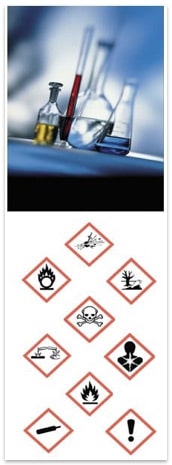
Process Safety
OVERVIEW
If a process cannot be run safely, it should not be run at all! At Agfa, we take process safety very seriously.
Unfortunately enough, serious accidents still happen in the chemical industry, sometimes with severe consequences such as loss of lives, damage to plants and properties, environmental impact, etc. Most of these accidents are avoidable, and when it comes to reactive chemistry incidents, most often a lack of knowledge of the basic process safety characteristics of the process forms the basis of the events leading to the accident.
Since Agfa Heultje is a Seveso company, we have built up a large amount of expertise in the domain of process safety testing. When analyzing the process safety hazards of a specific chemical reaction, several aspects should be considered.
Stability of reagents, raw materials and final product
Some reagents which are often used in the chemical industry have a limited stability, like hydroxylamine, hydrogen peroxide, thionyl chloride, etc.
The starting products or the finally desired product may also be unstable under certain process conditions, e.g. at higher temperatures or when exposed to metal surfaces. A screening of all the products present in your process stream is therefore necessary in order to guarantee a safe process design.
Several techniques are routinely available at Agfa to perform these stability tests.
Heat and gas generation during the process
During the chemical process to be performed, most often heat is being generated. In order to keep the process under control (i.e. at a stable reaction temperature), this heat has to be removed by some kind of cooling.
It is therefore of utmost importance to have a clear view on the amount of heat being generated and the time dependency of this heat generation (reaction kinetics). Any gaseous products being formed during the reaction may also have a serious impact on the overall process safety and should therefore be characterized.
At Agfa, we have several reaction calorimeters to perform this type of testing on a relevant lab scale.
Stability of the reaction mixture during and after the process
During the reactive phase in the reactor or after the reaction is finished, the reaction mixture can be exposed to a thermal or mechanical load.
If a reaction mixture is only stable for a limited period of time at a certain temperature, it is important to understand the kinetics of a possible decomposition reaction.
Agfa can help you in determining safe operating conditions both under desired process conditions and in the case of inadvertent process deviations.
TECHNIQUES
Reaction calorimetry
The reaction heat and any possible gas being generated during the process are measured in a reaction calorimeter.
In this jacketed glass reactor, the process is mimicked at lab scale (1 or 2 liter) under controlled conditions. Relevant process characteristics such as total heat generation, peak heat evolution, gas evolution rate, total gas evolution, thermal accumulation and adiabatic temperature rise are routinely determined.
These data are critical to ensure a safe operation of the process. Advice can be provided on recommended dosing times, required cooling capacity, etc.
Thermal stability testing
The thermal stability of reagents, products and reaction mixtures can be determined at Agfa in different types of equipment.
- DSC is is a standard tool for the screening measurement of the total reaction energy or decomposition energy at a small scale. The measurement is very accurate but has no pressure measurement.
- RADEX measurement is comparable to the DSC measurement, but the experiment is run at a slightly larger scale (gram scale) than DSC. The heat generation data are qualitative (versus quantitative for DSC), pressure measurement is possible.
- C80 (Setaram) measurement is comparable to the DSC measurement but with an even higher accuracy. Heat generation data are quantitative, there is no pressure measurement. Special test cells are available that allow the mixing of 2 compounds inside the instrument.
- ARC is an adiabatic calorimeter, mimicking the worst case scenario that could be encountered in a large scale production vessel when a loss of cooling occurs. The measurement is very sensitive and generates quantitative heat and gas generation data.
EQUIPMENT AND METHODS
- Several DSC and TGA instruments (Netzsch, TA)
- RADEX (Systag) with glass, stainless steel and hastelloy test cells, scanning and isothermal experiments, with our without pressure measurement
- C80 (Setaram) calorimeter with standard high pressure stainless steel cell and reversal mixing stainless steel cell
- Accelerating Rate Calorimeter (ARC) form THT, can be used in heat-wait-search mode or in isothermal mode, truly adiabatic testing with pressure measurement
- Mettler AP01 RC1 reaction calorimeter, 2 liter scale, glass inserts, atmospheric pressure, gas measurement in place
- Mettler MP06 RC1 reaction calorimeter, 1 liter scale, hastelloy inserts, pressure up till 6 bar, pressure measurement
Let's Talk
Fill out this form, and we'll revert to you as soon as possible.
Please provide a detailed description of your question or request.
